Reflective Journal: Analysis of Presentation Skills using Gibbs Model
VerifiedAdded on 2023/01/10
|8
|2017
|88
Report
AI Summary
This report presents a reflective journal analyzing a presentation experience using the Gibbs model. The journal details the student's experience, feelings, evaluation, and analysis of a presentation activity focused on employability skills, teamwork, and communication. The student, initially hesitant, reflects on the importance of teamwork, communication, and time management. The analysis highlights strengths in research, communication, and problem-solving, while also identifying weaknesses in time management and ICT skills. The conclusion emphasizes the value of self-awareness and the need for a proactive action plan to improve these skills. The report concludes that the Gibbs reflective cycle is an effective tool for identifying areas of development in academic, personal, and professional spheres, emphasizing the importance of teamwork and skills development. The student plans to enhance ICT and time management skills to improve future performance and career prospects.
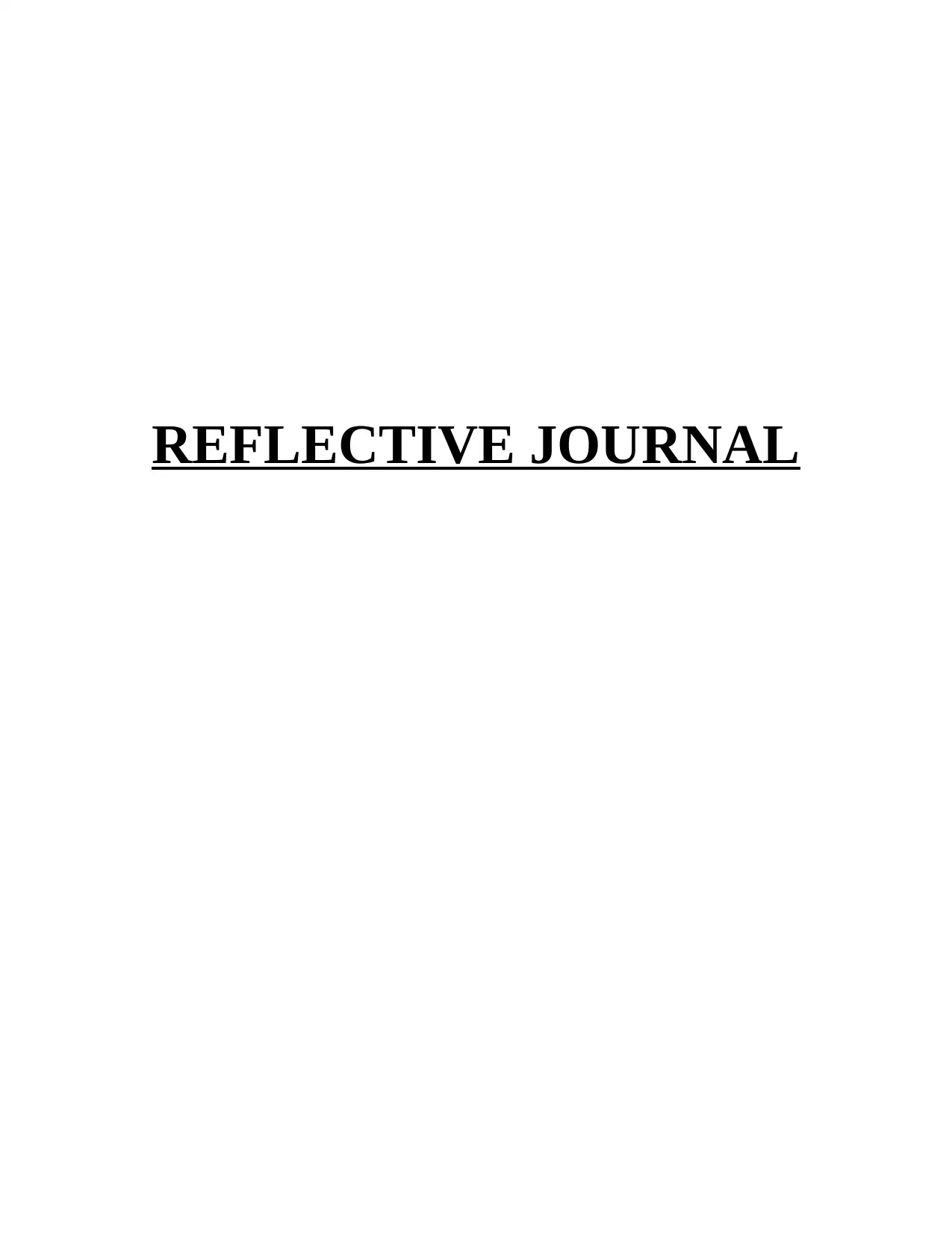
REFLECTIVE JOURNAL
Paraphrase This Document
Need a fresh take? Get an instant paraphrase of this document with our AI Paraphraser
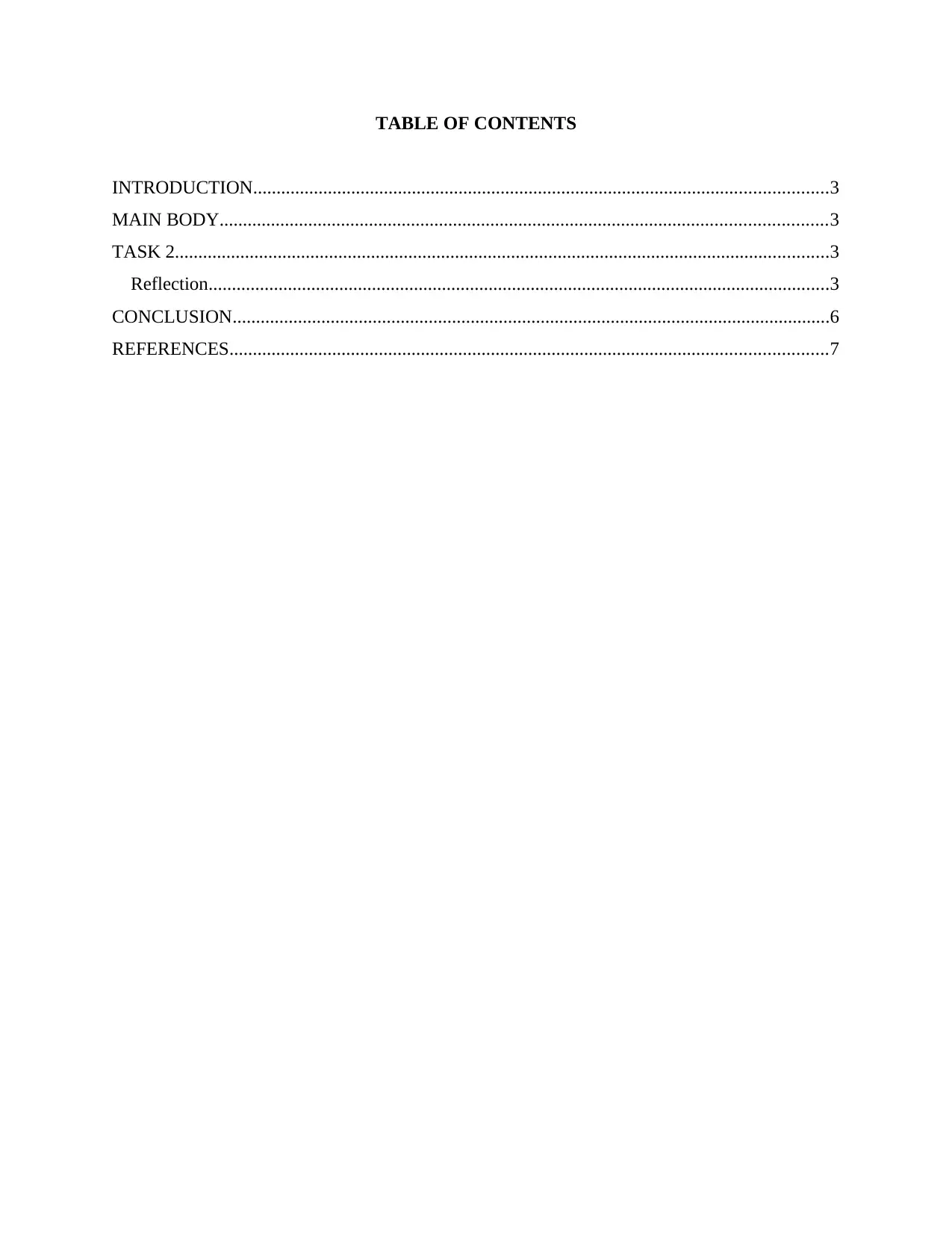
TABLE OF CONTENTS
INTRODUCTION...........................................................................................................................3
MAIN BODY..................................................................................................................................3
TASK 2............................................................................................................................................3
Reflection.....................................................................................................................................3
CONCLUSION................................................................................................................................6
REFERENCES................................................................................................................................7
INTRODUCTION...........................................................................................................................3
MAIN BODY..................................................................................................................................3
TASK 2............................................................................................................................................3
Reflection.....................................................................................................................................3
CONCLUSION................................................................................................................................6
REFERENCES................................................................................................................................7
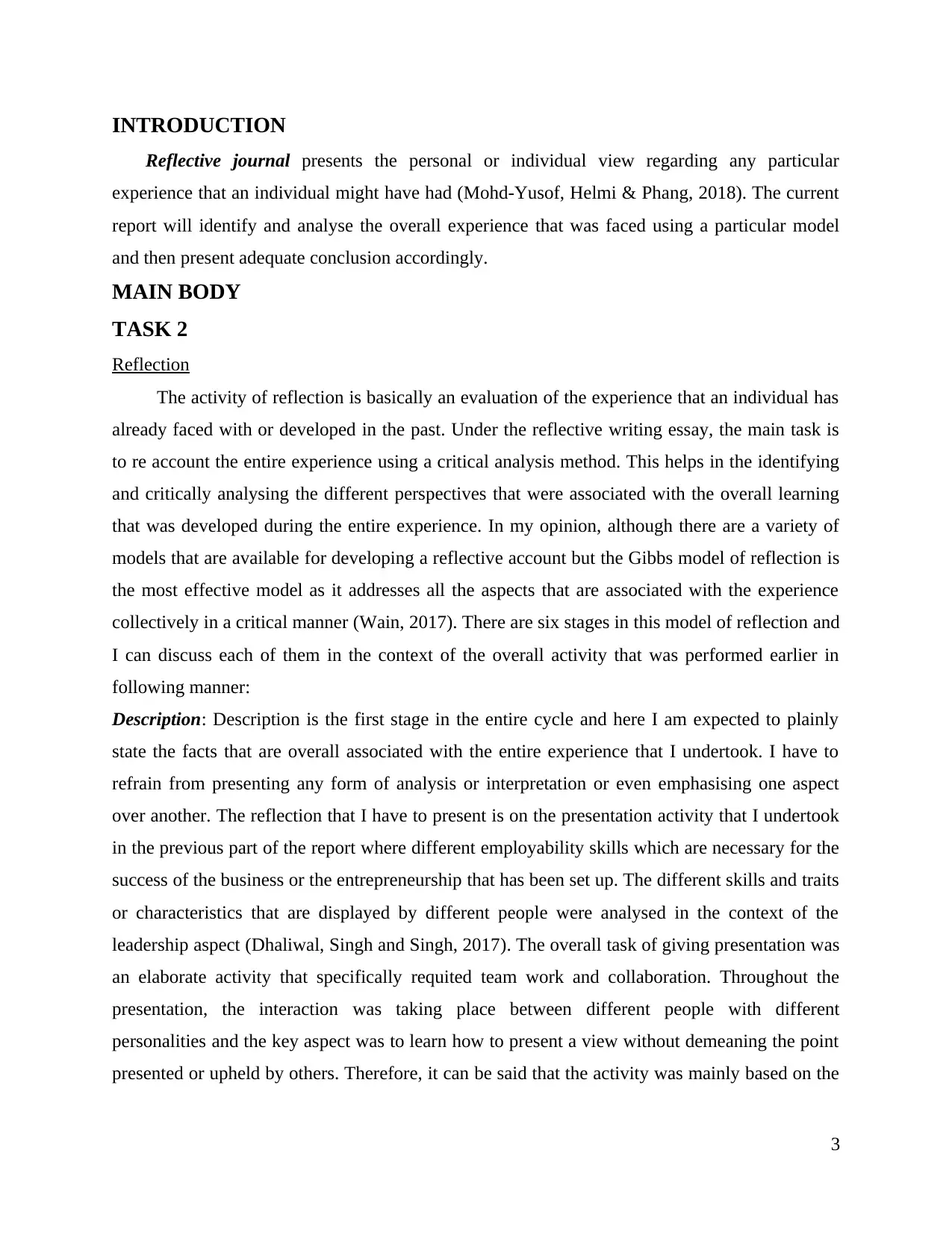
INTRODUCTION
Reflective journal presents the personal or individual view regarding any particular
experience that an individual might have had (Mohd-Yusof, Helmi & Phang, 2018). The current
report will identify and analyse the overall experience that was faced using a particular model
and then present adequate conclusion accordingly.
MAIN BODY
TASK 2
Reflection
The activity of reflection is basically an evaluation of the experience that an individual has
already faced with or developed in the past. Under the reflective writing essay, the main task is
to re account the entire experience using a critical analysis method. This helps in the identifying
and critically analysing the different perspectives that were associated with the overall learning
that was developed during the entire experience. In my opinion, although there are a variety of
models that are available for developing a reflective account but the Gibbs model of reflection is
the most effective model as it addresses all the aspects that are associated with the experience
collectively in a critical manner (Wain, 2017). There are six stages in this model of reflection and
I can discuss each of them in the context of the overall activity that was performed earlier in
following manner:
Description: Description is the first stage in the entire cycle and here I am expected to plainly
state the facts that are overall associated with the entire experience that I undertook. I have to
refrain from presenting any form of analysis or interpretation or even emphasising one aspect
over another. The reflection that I have to present is on the presentation activity that I undertook
in the previous part of the report where different employability skills which are necessary for the
success of the business or the entrepreneurship that has been set up. The different skills and traits
or characteristics that are displayed by different people were analysed in the context of the
leadership aspect (Dhaliwal, Singh and Singh, 2017). The overall task of giving presentation was
an elaborate activity that specifically requited team work and collaboration. Throughout the
presentation, the interaction was taking place between different people with different
personalities and the key aspect was to learn how to present a view without demeaning the point
presented or upheld by others. Therefore, it can be said that the activity was mainly based on the
3
Reflective journal presents the personal or individual view regarding any particular
experience that an individual might have had (Mohd-Yusof, Helmi & Phang, 2018). The current
report will identify and analyse the overall experience that was faced using a particular model
and then present adequate conclusion accordingly.
MAIN BODY
TASK 2
Reflection
The activity of reflection is basically an evaluation of the experience that an individual has
already faced with or developed in the past. Under the reflective writing essay, the main task is
to re account the entire experience using a critical analysis method. This helps in the identifying
and critically analysing the different perspectives that were associated with the overall learning
that was developed during the entire experience. In my opinion, although there are a variety of
models that are available for developing a reflective account but the Gibbs model of reflection is
the most effective model as it addresses all the aspects that are associated with the experience
collectively in a critical manner (Wain, 2017). There are six stages in this model of reflection and
I can discuss each of them in the context of the overall activity that was performed earlier in
following manner:
Description: Description is the first stage in the entire cycle and here I am expected to plainly
state the facts that are overall associated with the entire experience that I undertook. I have to
refrain from presenting any form of analysis or interpretation or even emphasising one aspect
over another. The reflection that I have to present is on the presentation activity that I undertook
in the previous part of the report where different employability skills which are necessary for the
success of the business or the entrepreneurship that has been set up. The different skills and traits
or characteristics that are displayed by different people were analysed in the context of the
leadership aspect (Dhaliwal, Singh and Singh, 2017). The overall task of giving presentation was
an elaborate activity that specifically requited team work and collaboration. Throughout the
presentation, the interaction was taking place between different people with different
personalities and the key aspect was to learn how to present a view without demeaning the point
presented or upheld by others. Therefore, it can be said that the activity was mainly based on the
3
⊘ This is a preview!⊘
Do you want full access?
Subscribe today to unlock all pages.

Trusted by 1+ million students worldwide
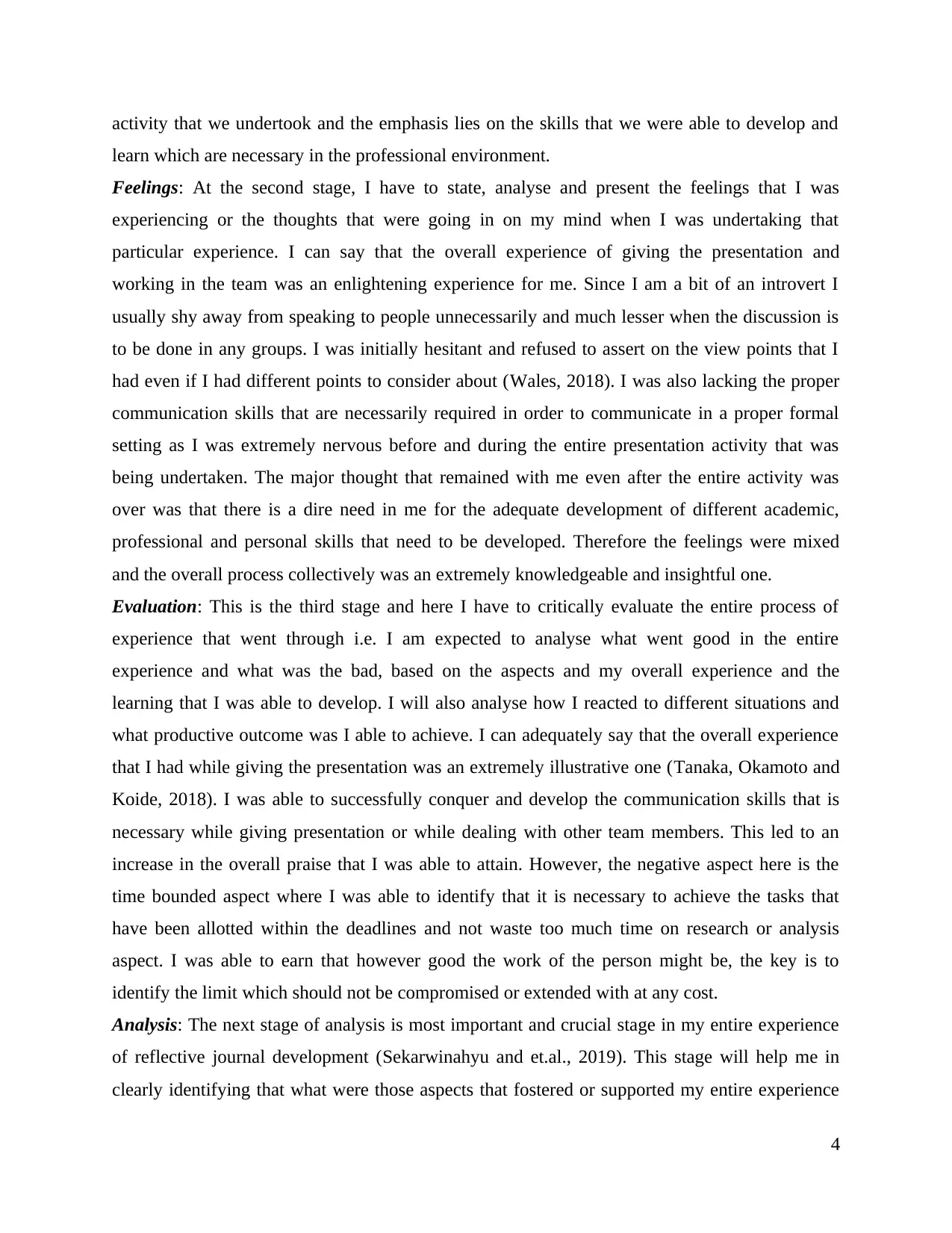
activity that we undertook and the emphasis lies on the skills that we were able to develop and
learn which are necessary in the professional environment.
Feelings: At the second stage, I have to state, analyse and present the feelings that I was
experiencing or the thoughts that were going in on my mind when I was undertaking that
particular experience. I can say that the overall experience of giving the presentation and
working in the team was an enlightening experience for me. Since I am a bit of an introvert I
usually shy away from speaking to people unnecessarily and much lesser when the discussion is
to be done in any groups. I was initially hesitant and refused to assert on the view points that I
had even if I had different points to consider about (Wales, 2018). I was also lacking the proper
communication skills that are necessarily required in order to communicate in a proper formal
setting as I was extremely nervous before and during the entire presentation activity that was
being undertaken. The major thought that remained with me even after the entire activity was
over was that there is a dire need in me for the adequate development of different academic,
professional and personal skills that need to be developed. Therefore the feelings were mixed
and the overall process collectively was an extremely knowledgeable and insightful one.
Evaluation: This is the third stage and here I have to critically evaluate the entire process of
experience that went through i.e. I am expected to analyse what went good in the entire
experience and what was the bad, based on the aspects and my overall experience and the
learning that I was able to develop. I will also analyse how I reacted to different situations and
what productive outcome was I able to achieve. I can adequately say that the overall experience
that I had while giving the presentation was an extremely illustrative one (Tanaka, Okamoto and
Koide, 2018). I was able to successfully conquer and develop the communication skills that is
necessary while giving presentation or while dealing with other team members. This led to an
increase in the overall praise that I was able to attain. However, the negative aspect here is the
time bounded aspect where I was able to identify that it is necessary to achieve the tasks that
have been allotted within the deadlines and not waste too much time on research or analysis
aspect. I was able to earn that however good the work of the person might be, the key is to
identify the limit which should not be compromised or extended with at any cost.
Analysis: The next stage of analysis is most important and crucial stage in my entire experience
of reflective journal development (Sekarwinahyu and et.al., 2019). This stage will help me in
clearly identifying that what were those aspects that fostered or supported my entire experience
4
learn which are necessary in the professional environment.
Feelings: At the second stage, I have to state, analyse and present the feelings that I was
experiencing or the thoughts that were going in on my mind when I was undertaking that
particular experience. I can say that the overall experience of giving the presentation and
working in the team was an enlightening experience for me. Since I am a bit of an introvert I
usually shy away from speaking to people unnecessarily and much lesser when the discussion is
to be done in any groups. I was initially hesitant and refused to assert on the view points that I
had even if I had different points to consider about (Wales, 2018). I was also lacking the proper
communication skills that are necessarily required in order to communicate in a proper formal
setting as I was extremely nervous before and during the entire presentation activity that was
being undertaken. The major thought that remained with me even after the entire activity was
over was that there is a dire need in me for the adequate development of different academic,
professional and personal skills that need to be developed. Therefore the feelings were mixed
and the overall process collectively was an extremely knowledgeable and insightful one.
Evaluation: This is the third stage and here I have to critically evaluate the entire process of
experience that went through i.e. I am expected to analyse what went good in the entire
experience and what was the bad, based on the aspects and my overall experience and the
learning that I was able to develop. I will also analyse how I reacted to different situations and
what productive outcome was I able to achieve. I can adequately say that the overall experience
that I had while giving the presentation was an extremely illustrative one (Tanaka, Okamoto and
Koide, 2018). I was able to successfully conquer and develop the communication skills that is
necessary while giving presentation or while dealing with other team members. This led to an
increase in the overall praise that I was able to attain. However, the negative aspect here is the
time bounded aspect where I was able to identify that it is necessary to achieve the tasks that
have been allotted within the deadlines and not waste too much time on research or analysis
aspect. I was able to earn that however good the work of the person might be, the key is to
identify the limit which should not be compromised or extended with at any cost.
Analysis: The next stage of analysis is most important and crucial stage in my entire experience
of reflective journal development (Sekarwinahyu and et.al., 2019). This stage will help me in
clearly identifying that what were those aspects that fostered or supported my entire experience
4
Paraphrase This Document
Need a fresh take? Get an instant paraphrase of this document with our AI Paraphraser
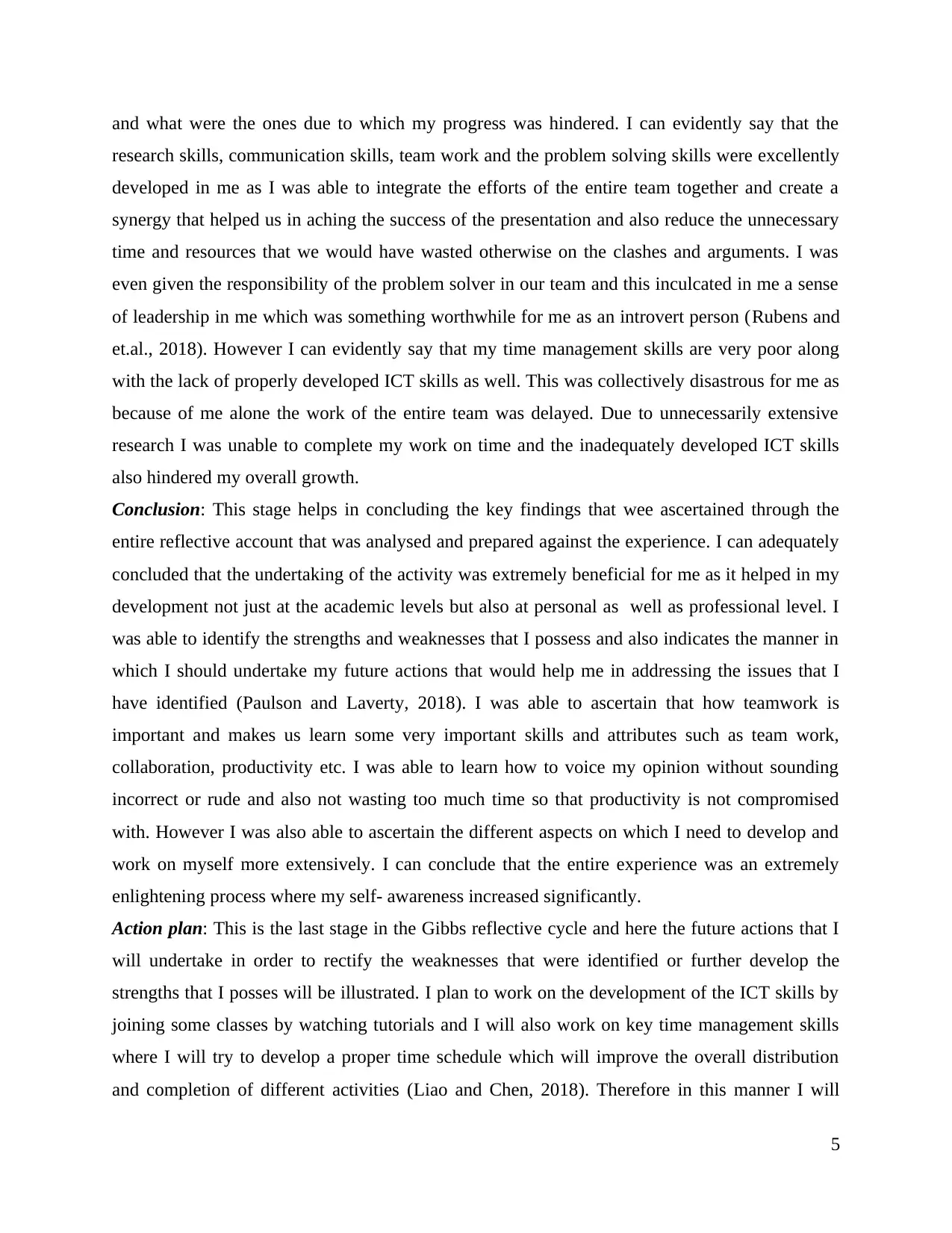
and what were the ones due to which my progress was hindered. I can evidently say that the
research skills, communication skills, team work and the problem solving skills were excellently
developed in me as I was able to integrate the efforts of the entire team together and create a
synergy that helped us in aching the success of the presentation and also reduce the unnecessary
time and resources that we would have wasted otherwise on the clashes and arguments. I was
even given the responsibility of the problem solver in our team and this inculcated in me a sense
of leadership in me which was something worthwhile for me as an introvert person (Rubens and
et.al., 2018). However I can evidently say that my time management skills are very poor along
with the lack of properly developed ICT skills as well. This was collectively disastrous for me as
because of me alone the work of the entire team was delayed. Due to unnecessarily extensive
research I was unable to complete my work on time and the inadequately developed ICT skills
also hindered my overall growth.
Conclusion: This stage helps in concluding the key findings that wee ascertained through the
entire reflective account that was analysed and prepared against the experience. I can adequately
concluded that the undertaking of the activity was extremely beneficial for me as it helped in my
development not just at the academic levels but also at personal as well as professional level. I
was able to identify the strengths and weaknesses that I possess and also indicates the manner in
which I should undertake my future actions that would help me in addressing the issues that I
have identified (Paulson and Laverty, 2018). I was able to ascertain that how teamwork is
important and makes us learn some very important skills and attributes such as team work,
collaboration, productivity etc. I was able to learn how to voice my opinion without sounding
incorrect or rude and also not wasting too much time so that productivity is not compromised
with. However I was also able to ascertain the different aspects on which I need to develop and
work on myself more extensively. I can conclude that the entire experience was an extremely
enlightening process where my self- awareness increased significantly.
Action plan: This is the last stage in the Gibbs reflective cycle and here the future actions that I
will undertake in order to rectify the weaknesses that were identified or further develop the
strengths that I posses will be illustrated. I plan to work on the development of the ICT skills by
joining some classes by watching tutorials and I will also work on key time management skills
where I will try to develop a proper time schedule which will improve the overall distribution
and completion of different activities (Liao and Chen, 2018). Therefore in this manner I will
5
research skills, communication skills, team work and the problem solving skills were excellently
developed in me as I was able to integrate the efforts of the entire team together and create a
synergy that helped us in aching the success of the presentation and also reduce the unnecessary
time and resources that we would have wasted otherwise on the clashes and arguments. I was
even given the responsibility of the problem solver in our team and this inculcated in me a sense
of leadership in me which was something worthwhile for me as an introvert person (Rubens and
et.al., 2018). However I can evidently say that my time management skills are very poor along
with the lack of properly developed ICT skills as well. This was collectively disastrous for me as
because of me alone the work of the entire team was delayed. Due to unnecessarily extensive
research I was unable to complete my work on time and the inadequately developed ICT skills
also hindered my overall growth.
Conclusion: This stage helps in concluding the key findings that wee ascertained through the
entire reflective account that was analysed and prepared against the experience. I can adequately
concluded that the undertaking of the activity was extremely beneficial for me as it helped in my
development not just at the academic levels but also at personal as well as professional level. I
was able to identify the strengths and weaknesses that I possess and also indicates the manner in
which I should undertake my future actions that would help me in addressing the issues that I
have identified (Paulson and Laverty, 2018). I was able to ascertain that how teamwork is
important and makes us learn some very important skills and attributes such as team work,
collaboration, productivity etc. I was able to learn how to voice my opinion without sounding
incorrect or rude and also not wasting too much time so that productivity is not compromised
with. However I was also able to ascertain the different aspects on which I need to develop and
work on myself more extensively. I can conclude that the entire experience was an extremely
enlightening process where my self- awareness increased significantly.
Action plan: This is the last stage in the Gibbs reflective cycle and here the future actions that I
will undertake in order to rectify the weaknesses that were identified or further develop the
strengths that I posses will be illustrated. I plan to work on the development of the ICT skills by
joining some classes by watching tutorials and I will also work on key time management skills
where I will try to develop a proper time schedule which will improve the overall distribution
and completion of different activities (Liao and Chen, 2018). Therefore in this manner I will
5
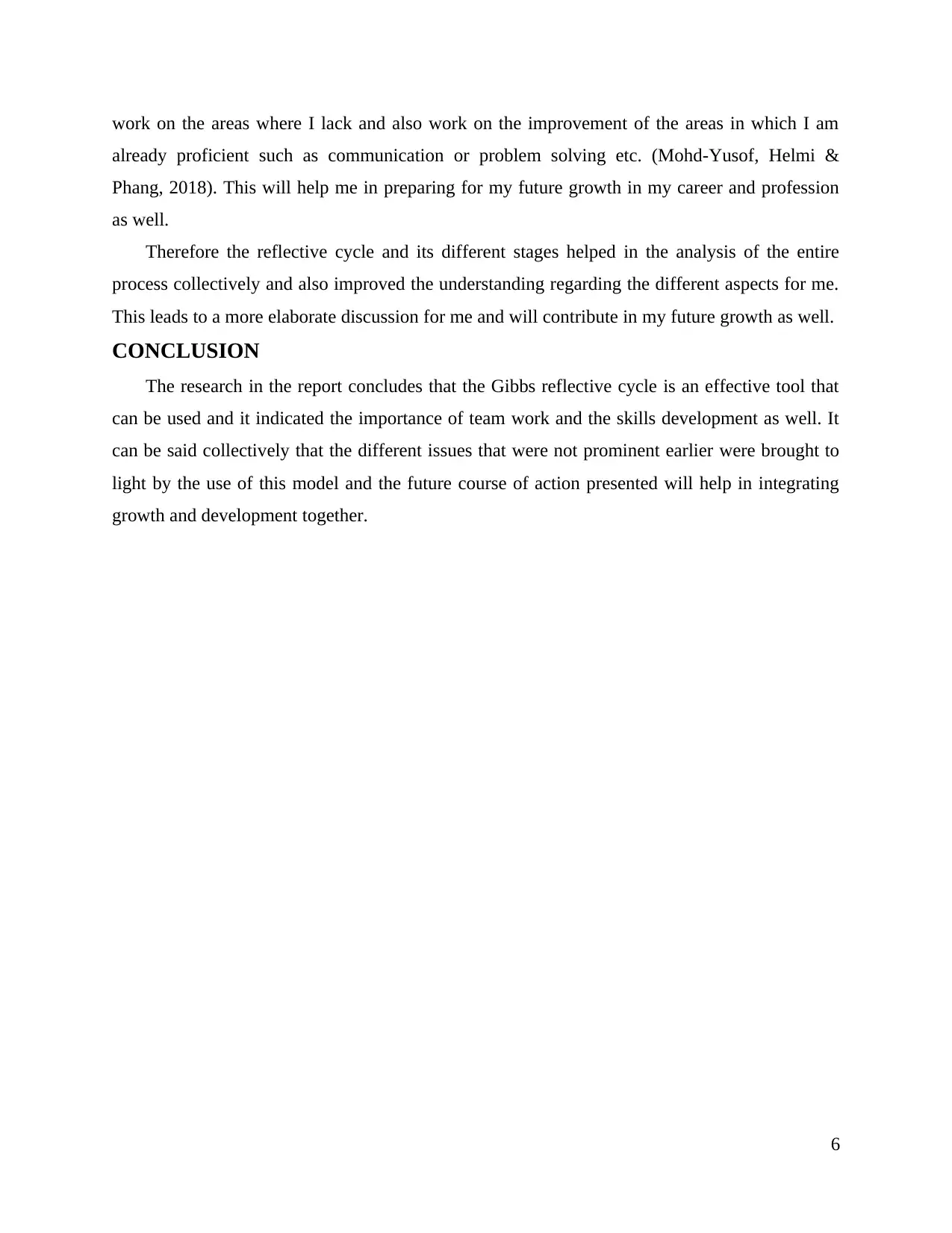
work on the areas where I lack and also work on the improvement of the areas in which I am
already proficient such as communication or problem solving etc. (Mohd-Yusof, Helmi &
Phang, 2018). This will help me in preparing for my future growth in my career and profession
as well.
Therefore the reflective cycle and its different stages helped in the analysis of the entire
process collectively and also improved the understanding regarding the different aspects for me.
This leads to a more elaborate discussion for me and will contribute in my future growth as well.
CONCLUSION
The research in the report concludes that the Gibbs reflective cycle is an effective tool that
can be used and it indicated the importance of team work and the skills development as well. It
can be said collectively that the different issues that were not prominent earlier were brought to
light by the use of this model and the future course of action presented will help in integrating
growth and development together.
6
already proficient such as communication or problem solving etc. (Mohd-Yusof, Helmi &
Phang, 2018). This will help me in preparing for my future growth in my career and profession
as well.
Therefore the reflective cycle and its different stages helped in the analysis of the entire
process collectively and also improved the understanding regarding the different aspects for me.
This leads to a more elaborate discussion for me and will contribute in my future growth as well.
CONCLUSION
The research in the report concludes that the Gibbs reflective cycle is an effective tool that
can be used and it indicated the importance of team work and the skills development as well. It
can be said collectively that the different issues that were not prominent earlier were brought to
light by the use of this model and the future course of action presented will help in integrating
growth and development together.
6
⊘ This is a preview!⊘
Do you want full access?
Subscribe today to unlock all pages.

Trusted by 1+ million students worldwide
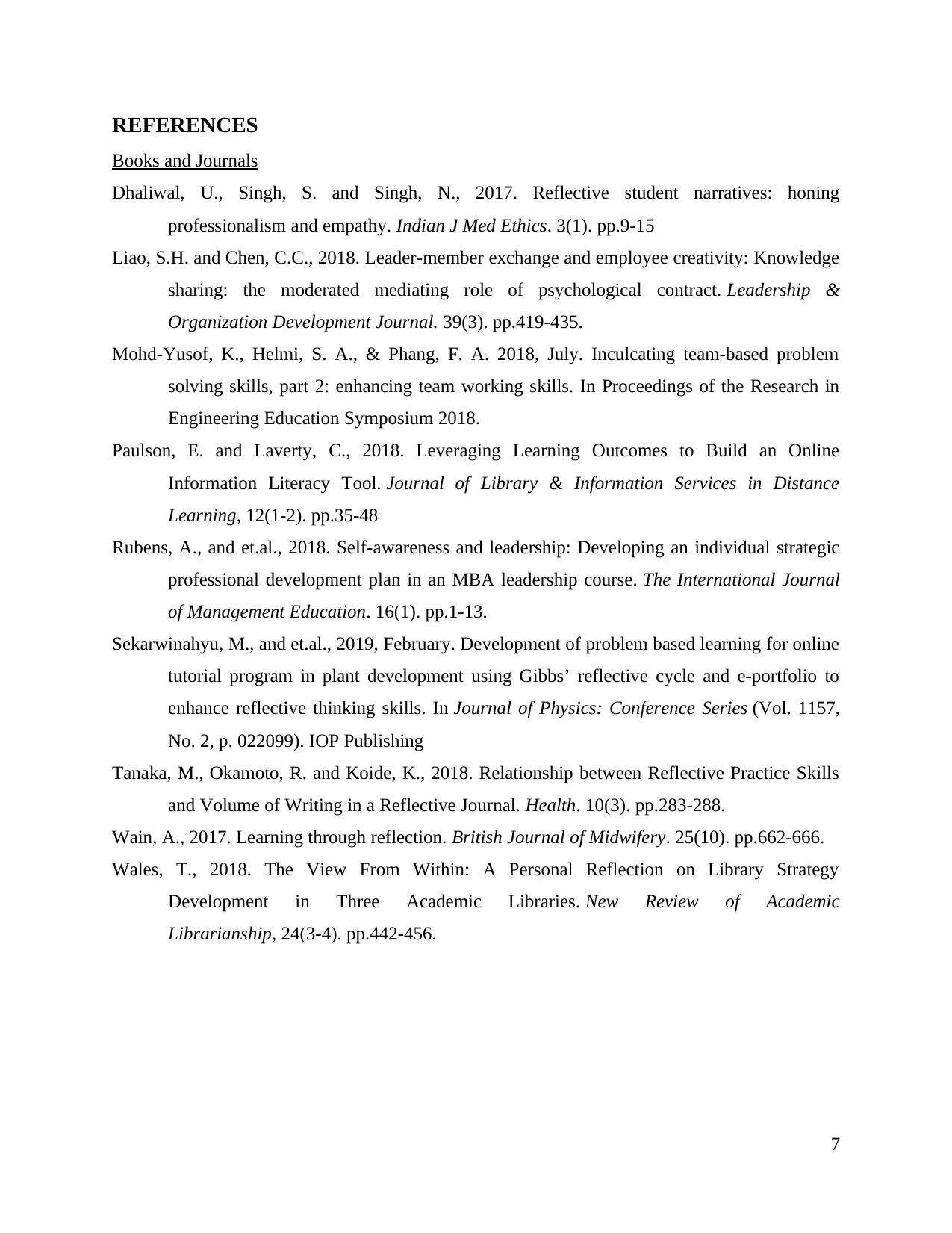
REFERENCES
Books and Journals
Dhaliwal, U., Singh, S. and Singh, N., 2017. Reflective student narratives: honing
professionalism and empathy. Indian J Med Ethics. 3(1). pp.9-15
Liao, S.H. and Chen, C.C., 2018. Leader-member exchange and employee creativity: Knowledge
sharing: the moderated mediating role of psychological contract. Leadership &
Organization Development Journal. 39(3). pp.419-435.
Mohd-Yusof, K., Helmi, S. A., & Phang, F. A. 2018, July. Inculcating team-based problem
solving skills, part 2: enhancing team working skills. In Proceedings of the Research in
Engineering Education Symposium 2018.
Paulson, E. and Laverty, C., 2018. Leveraging Learning Outcomes to Build an Online
Information Literacy Tool. Journal of Library & Information Services in Distance
Learning, 12(1-2). pp.35-48
Rubens, A., and et.al., 2018. Self-awareness and leadership: Developing an individual strategic
professional development plan in an MBA leadership course. The International Journal
of Management Education. 16(1). pp.1-13.
Sekarwinahyu, M., and et.al., 2019, February. Development of problem based learning for online
tutorial program in plant development using Gibbs’ reflective cycle and e-portfolio to
enhance reflective thinking skills. In Journal of Physics: Conference Series (Vol. 1157,
No. 2, p. 022099). IOP Publishing
Tanaka, M., Okamoto, R. and Koide, K., 2018. Relationship between Reflective Practice Skills
and Volume of Writing in a Reflective Journal. Health. 10(3). pp.283-288.
Wain, A., 2017. Learning through reflection. British Journal of Midwifery. 25(10). pp.662-666.
Wales, T., 2018. The View From Within: A Personal Reflection on Library Strategy
Development in Three Academic Libraries. New Review of Academic
Librarianship, 24(3-4). pp.442-456.
7
Books and Journals
Dhaliwal, U., Singh, S. and Singh, N., 2017. Reflective student narratives: honing
professionalism and empathy. Indian J Med Ethics. 3(1). pp.9-15
Liao, S.H. and Chen, C.C., 2018. Leader-member exchange and employee creativity: Knowledge
sharing: the moderated mediating role of psychological contract. Leadership &
Organization Development Journal. 39(3). pp.419-435.
Mohd-Yusof, K., Helmi, S. A., & Phang, F. A. 2018, July. Inculcating team-based problem
solving skills, part 2: enhancing team working skills. In Proceedings of the Research in
Engineering Education Symposium 2018.
Paulson, E. and Laverty, C., 2018. Leveraging Learning Outcomes to Build an Online
Information Literacy Tool. Journal of Library & Information Services in Distance
Learning, 12(1-2). pp.35-48
Rubens, A., and et.al., 2018. Self-awareness and leadership: Developing an individual strategic
professional development plan in an MBA leadership course. The International Journal
of Management Education. 16(1). pp.1-13.
Sekarwinahyu, M., and et.al., 2019, February. Development of problem based learning for online
tutorial program in plant development using Gibbs’ reflective cycle and e-portfolio to
enhance reflective thinking skills. In Journal of Physics: Conference Series (Vol. 1157,
No. 2, p. 022099). IOP Publishing
Tanaka, M., Okamoto, R. and Koide, K., 2018. Relationship between Reflective Practice Skills
and Volume of Writing in a Reflective Journal. Health. 10(3). pp.283-288.
Wain, A., 2017. Learning through reflection. British Journal of Midwifery. 25(10). pp.662-666.
Wales, T., 2018. The View From Within: A Personal Reflection on Library Strategy
Development in Three Academic Libraries. New Review of Academic
Librarianship, 24(3-4). pp.442-456.
7
Paraphrase This Document
Need a fresh take? Get an instant paraphrase of this document with our AI Paraphraser

8
1 out of 8
Related Documents
Your All-in-One AI-Powered Toolkit for Academic Success.
+13062052269
info@desklib.com
Available 24*7 on WhatsApp / Email
![[object Object]](/_next/static/media/star-bottom.7253800d.svg)
Unlock your academic potential
Copyright © 2020–2026 A2Z Services. All Rights Reserved. Developed and managed by ZUCOL.





